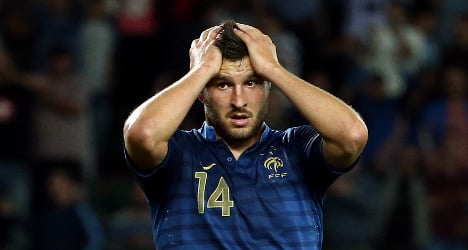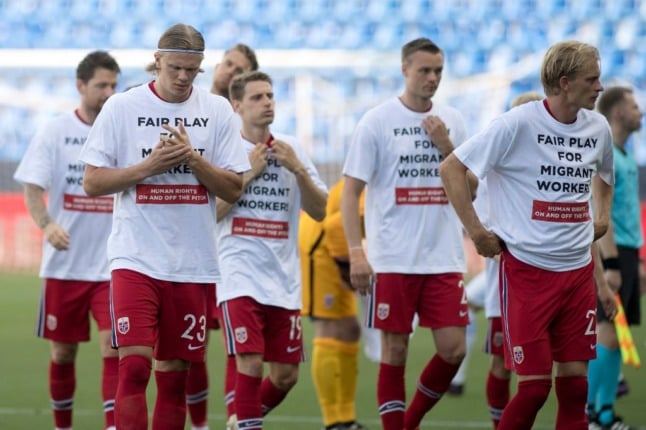Footballers always stress the importance of having their home fans behind them, but it appears Didier Deschamps' side don't have this luxury.
Les Bleus go into Tuesday's crucial World Cup qualifier against Finland in Paris, knowing that they're not particularly popular among the French public.
A BVA poll published in Le Parisien at the weekend revealed that more than eight out of ten French people have a negative opinion of the national team.
When probed further about their views on the players, respondents didn't hold back, with 85 percent saying Les Bleus were "stupid" and 73 percent believing they were "rude."
Some 84 percent slammed the players for being "individualistic" and 86 percent insisting they were "overpaid".
And the BVA poll even got personal with Franck Ribery, Karim Benzema and Samir Nasri picked out as the most unpopular players in the squad – with approval ratings even lower than beleaguered French President François Hollande.
Despite needing a win on Tuesday to qualify directly for next summer's World Cup in Brazil, the build up to the clash has all been about the results of the poll.
“Of course it hasn't gone unnoticed,” said French captain and goalkeeper Hugo Lloris.
“But we also know that when you win, it's easier and you feel more loved. We've had a difficult run but we are working to rectify the trend…and qualify for the World Cup, when we know the whole country will be behind us.”
Lloris might not have read another recent poll suggesting a slight majority of the French public would actually rather see their team miss out on a trip to Brazil 2014.
French coach Didier Deschamps bristled at the mention of the poll in a press conference before the match this week.
Asked whether the French football team had ever been as hated as it is now, the manager replied: "What kind of a question is that? Surveys about sports and other subjects do not really interest me. It's not something that's nice to read about or listen to.”
The current malaise around the French team is a far cry from 1998 when they were heralded as national heroes for winning the World Cup on home soil or even 2006 when they made the final in Germany, before losing to Italy on penalties.
The antipathy towards Les Bleus seems to stem from the infamous moment at the 2010 World Cup in South Africa when the team went on strike after a dressing room bust up with then coach Raymond Domenech.
For their part, the popularity of Ribery and Benzema has suffered a massive drop in France, since 2010, when a major scandal broke involving allegations the two stars had paid to have sex with then underage call girl Zahia Dahar.
SEE ALSO: Footballers on trial over sex with teen call girl
Yet even on Friday as the team romped to a 6-0 win at home to Australia, there was more than a hint of the antagonistic relationship between players and fans.
Star forward Benzema was jeered more than cheered when he entered the fray as a second-half substitute for Olivier Giroud, paying for a run of 1,222 minutes without scoring in the blue shirt of the national team.
When he did find the net, six minutes after his introduction, the home crowd appeared to have partially forgiven him.
Marseille playmaker Mathieu Valbuena was roundly booed every time he touched the ball, paying for his association with the fierce and bitter rivals of the host club at the Parc des Princes, Paris Saint-Germain.
Valbuena, though, failed to let the moment pass and his reaction could only serve to further tarnish an already strained relationship.
"Not much affects me. You have to forgive them, maybe they thought Paris were playing," said the diminutive midfielder after the game.
"You can't turn idiots into intelligent people. It's a shame because when you're wearing the France shirt they should get behind us, but it doesn't bother me."
Whether France will make it to Brazil is very much in doubt. The team know they are unlikely to make it through automatically as group winners, with current leaders Spain knowing a draw at home to Georgia on Tuesday will be enough to see them on the plane to Brazil.
That leaves France facing the prospect of a two-legged play off against another group runner up, including Sweden and possibly even England, should they fail to beat Poland on Tuesday.
It would be too much to hope for Georgia to win in Spain, but another handsome victory and an impressive display in the northern suburbs of Paris will at least provide Les Bleus with a confidence boost ahead of the play-offs, and perhaps help win a few hearts and minds at the same time.
What do you think of the French football team?
Don't miss a story about France – Join us on Facebook and Twitter.




 Please whitelist us to continue reading.
Please whitelist us to continue reading.
Member comments